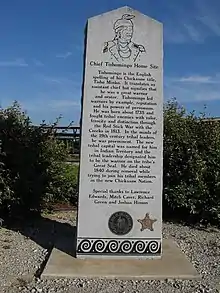Tishomingo (Chickasaw leader)
Tishomingo (Chickasaw: Tishominko; c. 1735 – c. 1837) was a Chickasaw chief, warrior, diplomat, and orator.
Tishomingo | |
|---|---|
Tishominko | |
 Marker in tribute to Tishomingo, on County Road 503 in Lee County, Mississippi. | |
| Born | Tishu Miko c. 1735 Mississippi, U.S. |
| Died | c. 1837 (about aged 102) near Little Rock, Arkansas, U.S. |
| Title | Chief of the Chickasaw nation |
| Military service | |
| Allegiance | |
| Campaigns | Indian Wars War of 1812 |
Etymology and pronunciation
The name Tishomingo, literally "Tishu Miko", means the "speaker for the leader", as he was second in power only to the Chickasaw "Minko," or hereditary king.[1]
Early life and military service
Tishomingo was born circa 1735 in Mississippi. He served with U.S. Army Major-General Anthony Wayne against the Shawnee in Northwest Territory and received a silver medal from President George Washington. He lead by example and was respected for his honesty and high moral standards, serving with distinction at Fallen Timbers, in the Red Stick War with the Creeks, and the War of 1812. During the War of 1812, Tishomingo served under future president Andrew Jackson.[2]
Later life and "Trail of Tears"
After the War of 1812, Tishomingo retired to his farm until white settlers came onto his land. He traveled to Philadelphia and Washington, D.C., and was a principal signatory of the treaties of 1816 and 1818 as well as the 1832 Treaty of Pontotoc. In 1837, a final treaty forced him and his family to relocate to the Indian Territory.
Legacy
The county of Tishomingo, the town of Tishomingo, and Tishomingo park in Mississippi; and the capital of Tishomingo in the Chickasaw Nation are named for him.
References
- Sawnton, John Reed (1928). Chickasaw Society and Religion. Lincoln, NE: University of Nebraska Press. pp. 42–43. ISBN 978-0-8032-9349-6.
- "Tishominko". Chickasaw Hall of Fame. The Chickasaw Nation. Retrieved September 22, 2020.